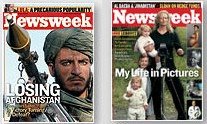Maggie says:
(Thanks to Counterspin for the tip-off.)
In a move I can only hope is understood by the masses, Newsweek is running two different magazine covers around the world this week. That's not at all uncommon, but the content of the cover stories this time around is cause for concern. Let's take a look:
On the left is the cover appearing in Europe, Latin American, and Asia. The cover story, "Losing Afghanistan," describes the "harsh truth" of Afghanistan, a place given up for lost by a superpower more focused on "fighting terror" in some other place instead.
"One year ago we couldn't have had such a meeting at midnight," says [Taliban fighter] Sabir, who is in his mid-40s and looks forward to living out his life as an anti-American jihadist. "Now we gather in broad daylight. The people know we are returning to power."
The problem, according to the article, is not enough manpower or direction.
In the countryside over the past year, Taliban guerrillas have filled a power vacuum that had been created by the relatively light NATO and U.S. military footprint of some 40,000 soldiers, and by the weakness of Afghan President Hamid Karzai's administration.
Meanwhile in the U.S., subscribers and (most importantly, in this case) checkout line customers are titallated by Annie Leibovitz, a talented photographer who touches us with her tales of celebrity.
"I talked with Angelina [Jolie] before the shoot," says Leibovitz, who's famous for her preparation. "She felt like she was coming back from having the baby and she felt very sexy and ready to go."
Which is the most important story here? Sure, celebrity infotainment regularly trumps hard news for its sex appeal. But the hard-hitting headline "Losing Afghanistan" is something that Middle America needs to see. And let's make no mistake: most of them won't see it unless it's splashed across the cover of a magazine.
Magazine covers speak to us for a reason. They tell us what's most important, most pressing, most exciting. A photographer playing with her kids doesn't exactly match up to a reminder of what we've done in a country that we have no intention of "fixing."
While the rest of the world gets the real story, Americans get fluff. As if we're not the ones who most need to face the repercussions of our actions. What makes the rest of the world more likely to hear this than us? And how can that dichotomy ever change if magazines like Newsweek don't start telling us the same news they tell the rest of the world, just as loudly?






|